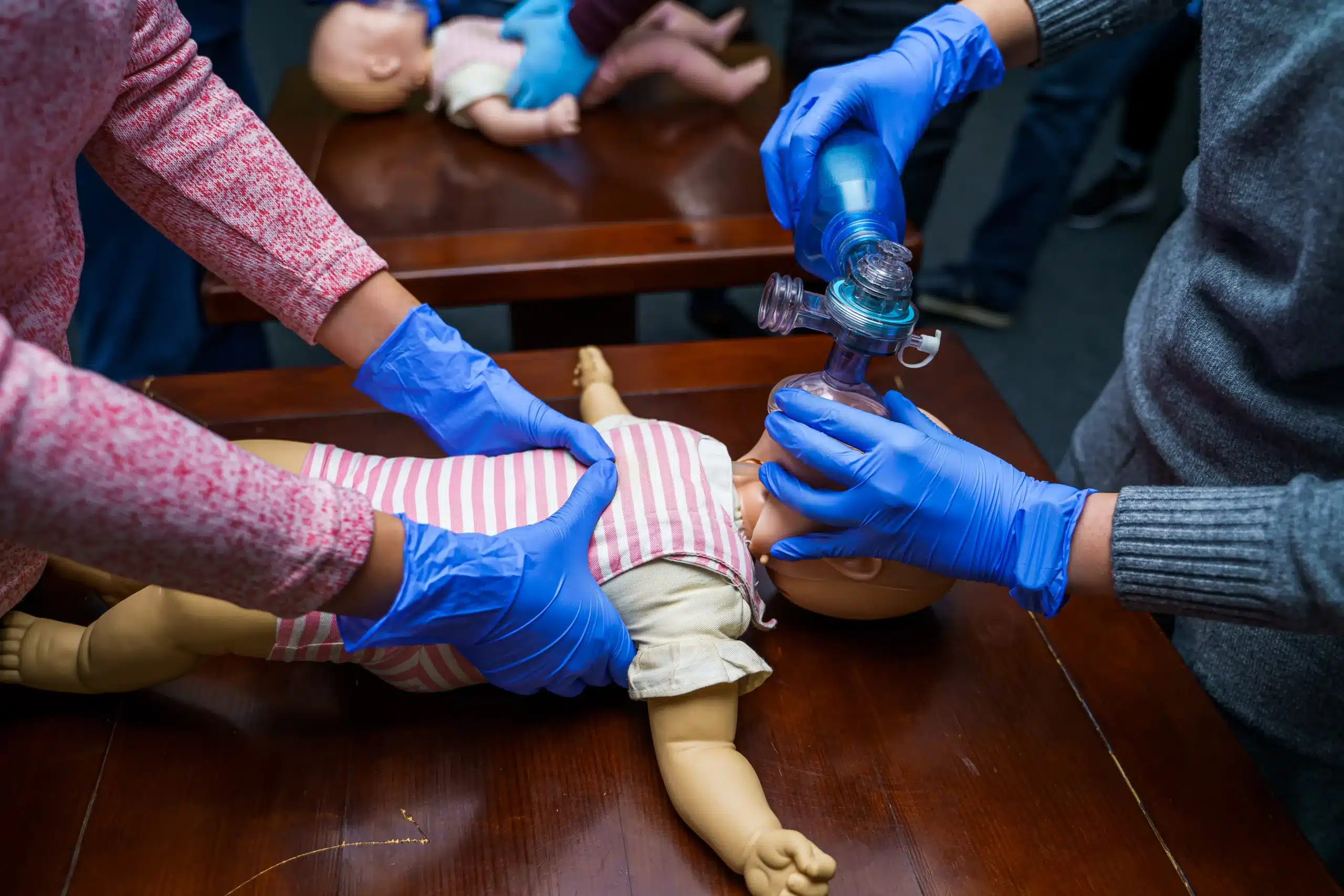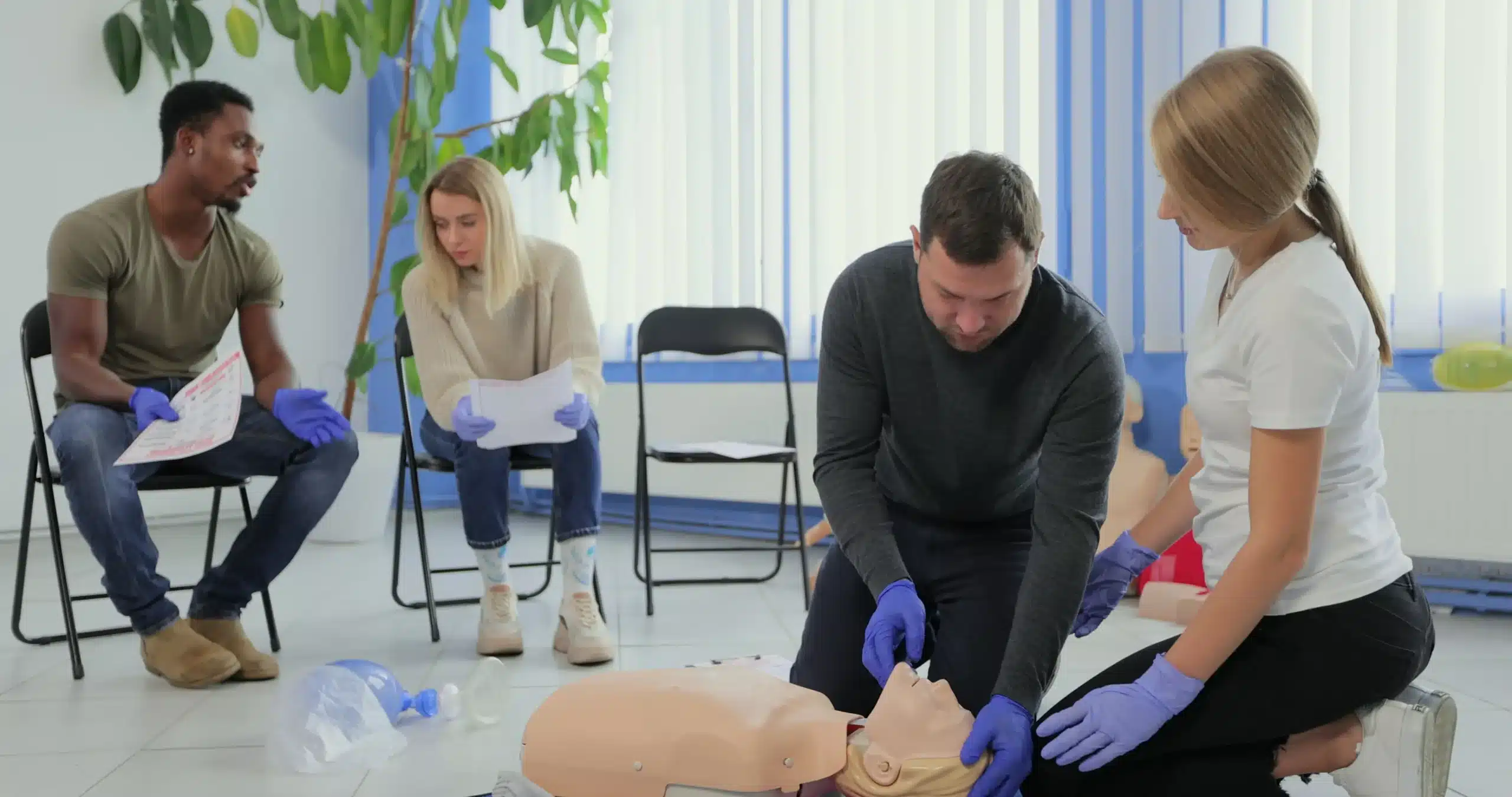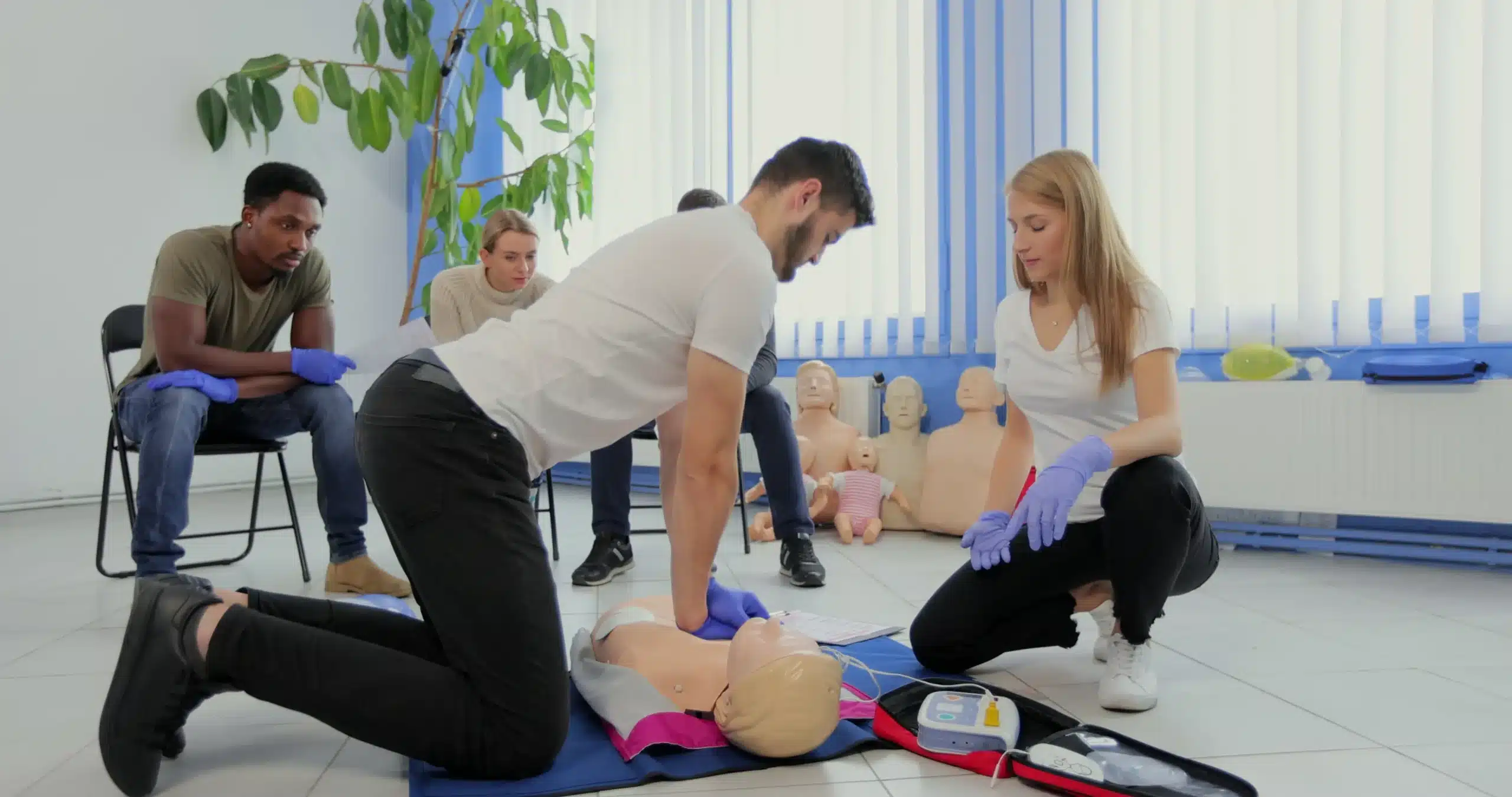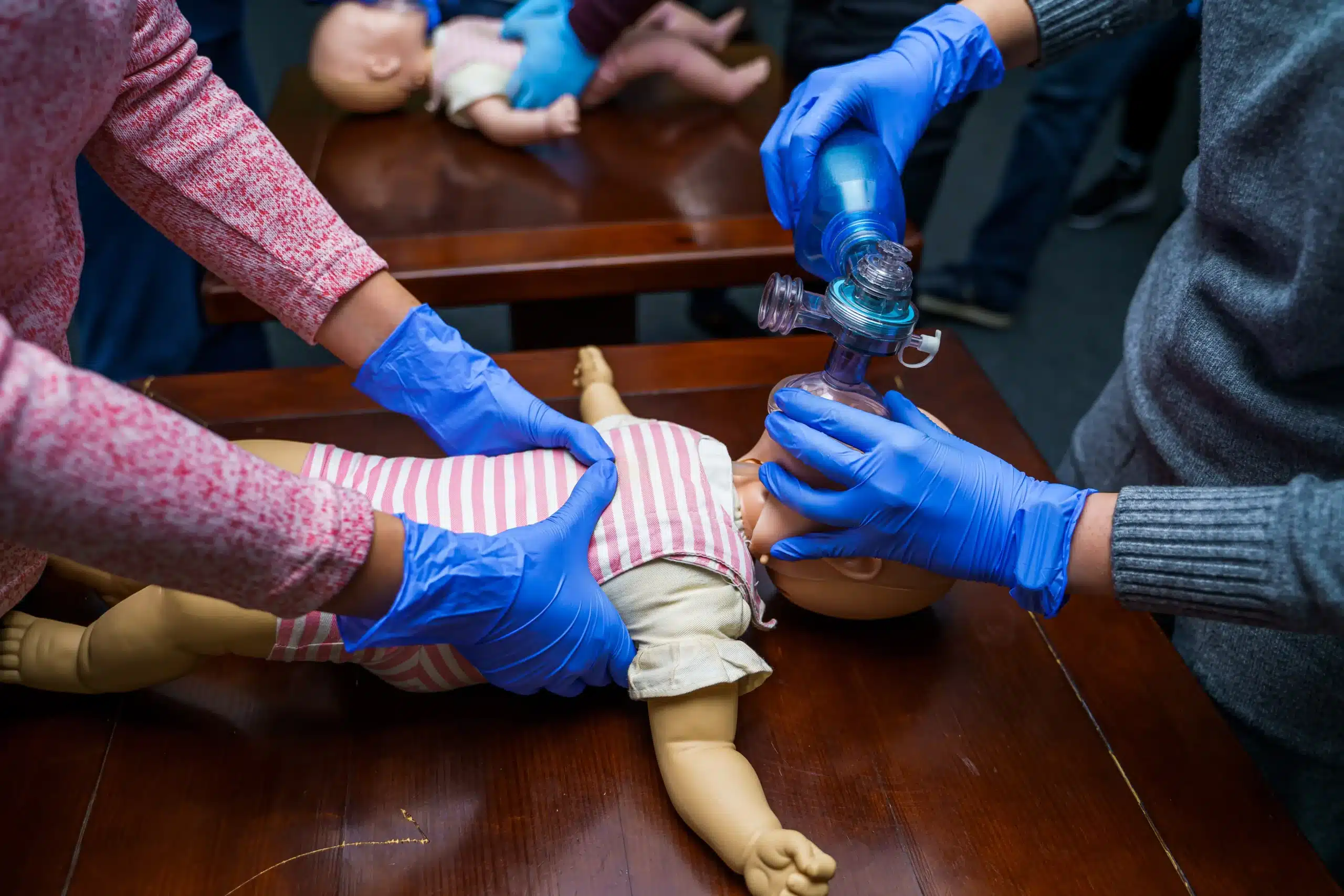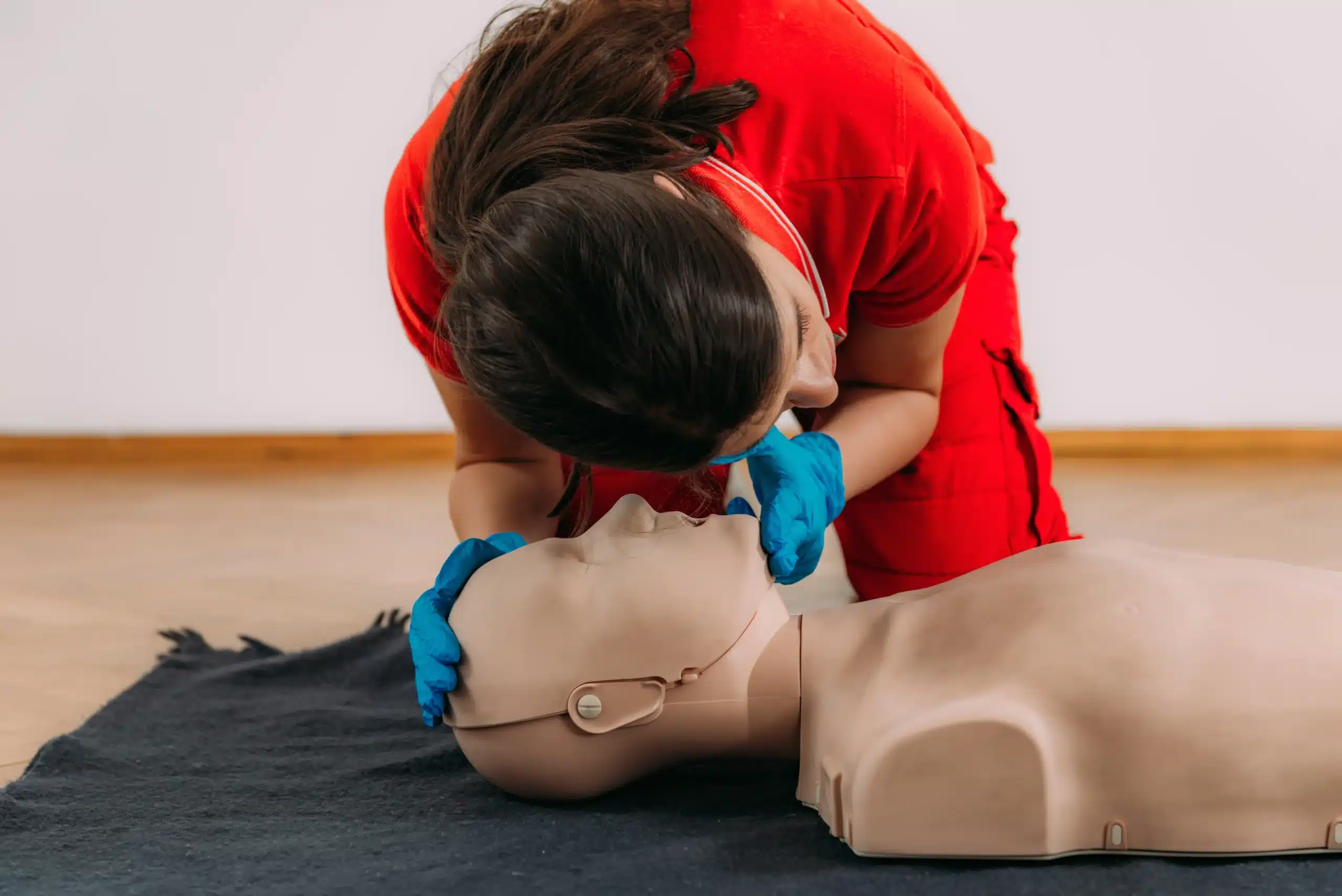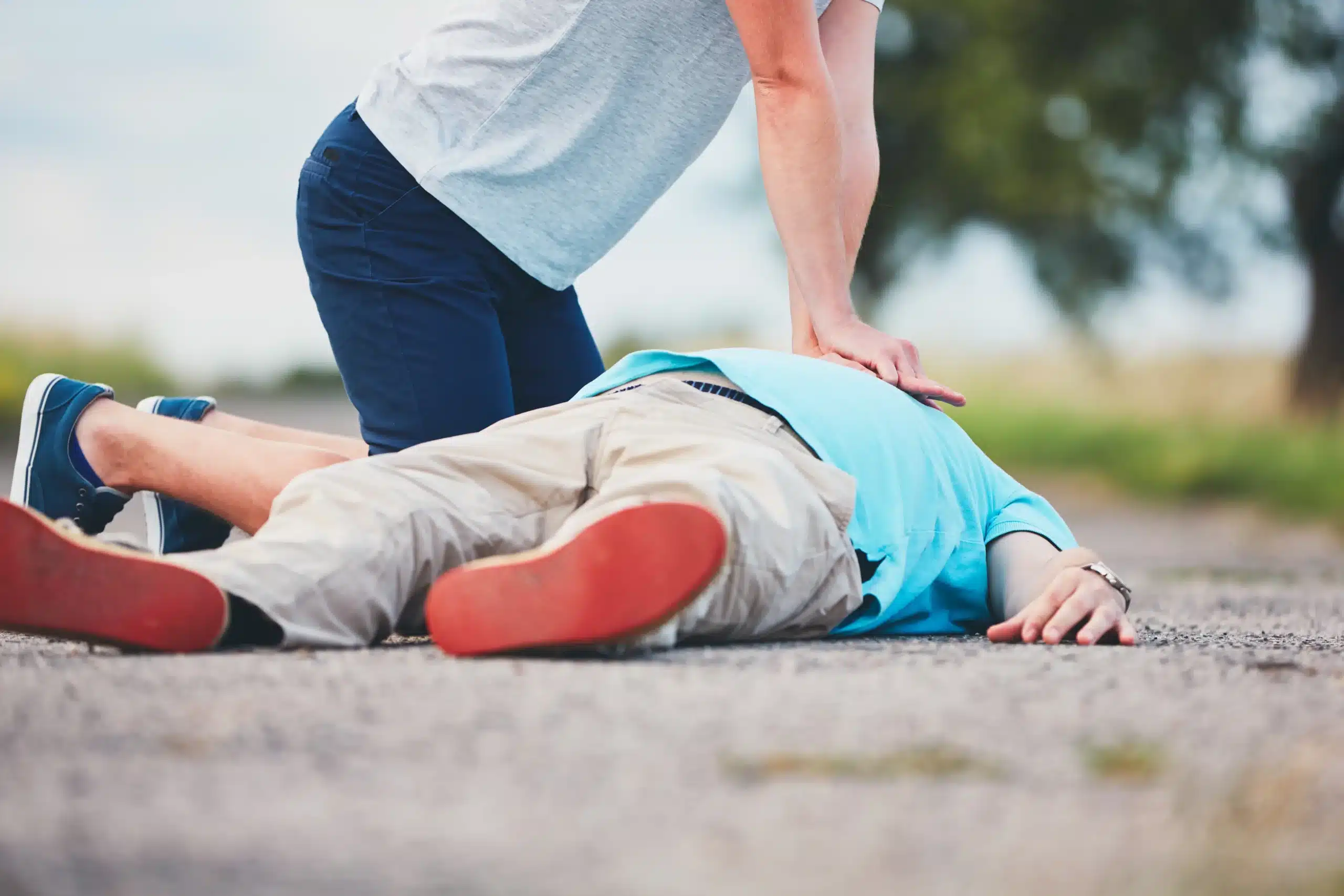Emergencies can happen anytime, anywhere. Are you ready to respond? Hands-on CPR training in Merced equips you with the skills and confidence to make a difference when it matters most. This article will explore the practical aspects of hands-on CPR training, highlighting its importance in developing the muscle memory and quick thinking needed during real emergencies. We’ll discuss the various CPR courses offered in Merced, from basic life support to advanced certifications, and provide insights into what a typical CPR class entails. We’ll also address common myths about CPR training and offer practical advice on maintaining your skills over time.
Key Takeaways
- Hands-on CPR training builds confidence: Working with mannequins and practicing in simulated scenarios develops the muscle memory and confidence needed to perform CPR effectively in real-life emergencies.
- CPR certification is a valuable asset: Whether for personal preparedness or career advancement, CPR certification equips you with essential life-saving skills and demonstrates your commitment to safety. Affordable options and flexible class schedules make training accessible to everyone.
- Maintaining CPR skills is an ongoing process: Regular refresher courses, online resources, and community involvement help reinforce your training and ensure you’re always prepared to respond confidently and effectively.
What is Hands-On CPR Training?
Hands-on CPR training gives you practical experience with cardiopulmonary resuscitation (CPR) techniques. You’ll work directly with CPR training mannequins, developing the muscle memory and confidence you need to perform compressions effectively. In a hands-on CPR class, you’ll learn exactly where and how hard to press for effective chest compressions. This tactile experience reinforces proper technique and builds confidence for real-world scenarios. Hands-on training also involves practicing your skills in simulated emergencies, so you can apply what you’ve learned under pressure. At Merced CPR Classes, we emphasize this hands-on approach in all our courses, from basic CPR to advanced certifications like ACLS and PALS.
CPR Courses in Merced
Merced offers a variety of CPR courses to suit different needs, from basic life support to advanced cardiac care. Whether you’re a healthcare professional, a concerned parent, or simply want to be prepared for emergencies, there’s a course for you. Let’s explore some of the CPR training options available in Merced:
Heartsaver CPR/AED
This course covers the essentials of CPR and how to use an automated external defibrillator (AED). It’s ideal for anyone who wants to learn basic life-saving skills, including teachers, coaches, and community members. Many fire departments offer CPR classes, though availability can vary. Check with your local fire department to see what courses they offer. The Heartsaver CPR/AED course provides the skills you need to respond to cardiac emergencies.
BLS for Healthcare Providers
The BLS for Healthcare Providers course is designed for healthcare professionals, including doctors, nurses, and paramedics. It covers advanced life support techniques, including airway management and medication administration. The American Heart Association’s Resuscitation Quality Improvement (RQI) program is a popular way for healthcare providers in Merced to obtain their BLS certification.
ACLS
The Advanced Cardiovascular Life Support (ACLS) course builds upon the skills learned in BLS. It focuses on managing cardiac arrest and other cardiovascular emergencies. HeartCode ACLS is a blended learning course that combines online learning with hands-on skills sessions. This format allows students to learn at their own pace before demonstrating their skills in person.
PALS
The Pediatric Advanced Life Support (PALS) course is designed for healthcare providers who care for infants and children. It covers the specialized techniques needed to manage pediatric emergencies. Like ACLS, PALS is often offered as a blended learning course, such as HeartCode PALS, combining online coursework with in-person skills practice.
Hands-Only CPR
Hands-Only CPR is a simplified version of CPR that focuses on chest compressions. It’s a valuable skill for anyone to learn, as it can help save lives during sudden cardiac arrest. Hands-on CPR training provides the tactile experience needed to build confidence and reinforce proper technique. You’ll practice on CPR training mannequins to learn the correct depth and rate of compressions.
What to Expect in a CPR Class
CPR classes blend theory and practice to equip you with the skills and confidence to respond effectively in emergencies. Here’s a glimpse of what a typical class entails:
Classroom Instruction
You’ll begin by covering essential concepts, like recognizing the signs of a cardiac arrest and understanding why immediate action is so important. Your instructor will clearly explain the steps of CPR, including how to deliver chest compressions, provide rescue breaths, and use an automated external defibrillator (AED). This foundational knowledge empowers you to provide life-saving care while waiting for paramedics, similar to the training described in this article on common CPR misconceptions. Visual aids and real-world examples will help you grasp these crucial concepts.
Skills Practice
Knowing the theory is only half the battle. The hands-on portion of the class lets you apply what you’ve learned using a CPR training mannequin. This is where you’ll develop muscle memory and get comfortable performing compressions and rescue breaths. You’ll learn the precise placement and depth needed for effective chest compressions, addressing common concerns like those highlighted in these myths about learning CPR. This hands-on practice builds your confidence for real-world emergencies.
Assessment & Certification
Finally, you’ll demonstrate your skills through a practical assessment. Your instructor will evaluate your technique to ensure you meet the required standards. After successfully completing this in-person skills session, you’ll receive a two-year certification, often meeting OSHA standards, much like the certifications described by the American Red Cross. This certification validates your training and allows you to confidently provide CPR when needed.
Find CPR Training in Merced
Looking for CPR training in Merced? You have several options, from established providers like the American Red Cross to specialized training centers. Let’s explore the choices available to you.
Location & Registration
If you’re ready to sign up for a CPR class with Merced CPR Classes, visit us at 368 E. Yosemite Ave., Suite 200E, Merced, CA 95340. You can easily register for classes online or give us a call at (209) 921-3507 for more information.
CPR Training Providers
Merced CPR Classes
Merced CPR Classes offers a range of American Heart Association (AHA) certified courses, including CPR, First Aid, BLS (Basic Life Support), ACLS (Advanced Cardiovascular Life Support), and PALS (Pediatric Advanced Life Support). Our classes are led by experienced instructors and designed to be both affordable and convenient. We also offer group discounts to make training accessible for everyone. Be sure to check our low price guarantee.
American Red Cross
The American Red Cross is a well-known provider of CPR/AED training and certification. They offer various learning formats, including in-person classes, online courses, and blended learning (a combination of online and in-person instruction). This flexibility allows you to choose the format that best suits your schedule and learning style. You can find Red Cross CPR classes offered throughout California, including Merced.
Local Hospitals & Medical Centers
Many local hospitals and medical centers in and around Merced also offer CPR training. Check with hospitals in your area for their course schedules and registration information. Additionally, your local fire department may offer CPR classes, though availability and cost can vary. Consider contacting your local fire department for more information about potential training opportunities.
Cost of CPR Training
CPR training is an investment in yourself and your community, and at Merced CPR Classes, we believe it should be accessible to everyone. We offer a variety of courses to meet different needs and budgets, and we’re committed to providing high-quality training at competitive prices. We also offer a low price guarantee, so you can feel confident that you’re getting the best possible value. Learn more on our low price guarantee page.
Standard Pricing
Our standard CPR and first-aid certification course is just $89. This covers both online learning materials and the in-person skills testing session. This blended approach lets you learn at your own pace online and then practice your skills in person with our certified instructors. For more details about our courses, visit our CPR and first-aid certification page.
Group Discounts
We offer discounts for group CPR classes. This is a great option for businesses, schools, or community groups looking to train multiple people. Our group discounts make it easier to equip your team with these essential skills. Contact us for a customized quote, or visit our group discount page for more information.
Price Match Guarantee
We’re so confident in our pricing that we offer a price match guarantee. If you find a comparable CPR course in the Merced area at a lower price, we’ll match it. We believe that cost shouldn’t be a barrier to learning CPR. See our price match guarantee page for details.
Flexible CPR Class Schedules
Finding the time for CPR training shouldn’t be a hurdle. We understand you have a busy schedule, so we offer classes seven days a week to fit your needs. We want to make getting your CPR certification as easy as possible.
Daily Classes (8 AM – 10 PM)
Our Merced CPR training location offers classes daily from 8 AM to 10 PM. This wide range of times means you can choose a class that works for you, whether you’re an early bird or prefer evening sessions. Browse our available class times and find the perfect fit.
Weekday & Weekend Options
We offer classes Monday through Sunday, providing even more flexibility. This means you can pursue your CPR training on a weekday or weekend—whatever is most convenient. This accessibility makes it easier to fit this essential training into your life.
Benefits of CPR Certification
Getting CPR certified offers several advantages, both personally and professionally. It’s a valuable skill that can make a real difference in critical situations. Here’s a closer look at the benefits:
Empower Yourself
Knowing CPR can give you the confidence to act quickly during emergencies. Instead of feeling helpless, you’ll have the skills to provide immediate care while waiting for paramedics. This knowledge can foster a greater sense of preparedness in your daily life. You’ll be ready to assist family, friends, coworkers, or even strangers in need.
Advance Your Career
CPR certification is often a requirement or a significant advantage in many professions. American Heart Association certifications are widely recognized by employers, especially in healthcare, education, and childcare. Listing this credential on your resume can create opportunities and demonstrate your commitment to safety. It can also give you an edge when applying for jobs or seeking promotions.
Employer Recognition
Many employers encourage their staff to obtain CPR certification. Some may even cover the training costs as part of professional development. This highlights the importance of CPR skills in the workplace and shows a commitment to employee well-being. It also creates a safer environment for everyone.
Meet OSHA Standards
In some industries, CPR certification is essential for meeting Occupational Safety and Health Administration (OSHA) standards. These standards often require employees to have current CPR and first-aid training to ensure workplace safety and regulatory compliance. Maintaining your certification demonstrates your commitment to a safe work environment.
CPR Training Myths
Let’s clear up some common misconceptions about CPR training. These myths can prevent people from learning this life-saving skill, so let’s debunk them:
“Only Healthcare Professionals Can Do CPR”
It’s easy to think only doctors and nurses can perform CPR. The truth is, anyone can learn CPR—it’s a skill designed for everyone. From students to teachers, parents to grandparents, construction workers to office managers—CPR training empowers you to respond effectively during emergencies. You don’t need a medical background to make a difference. Knowing CPR means you can provide immediate assistance, potentially bridging the gap before professional help arrives. This can significantly improve the chances of survival. Check out our course preparation page to learn more.
“CPR Always Saves Lives”
Movies and TV shows often portray CPR as a guaranteed life-saver. While CPR is undeniably crucial and can dramatically increase the odds of survival, it’s important to have realistic expectations. CPR doesn’t always result in a complete recovery. Several factors influence the outcome, including the underlying cause of the cardiac arrest and how quickly CPR is started. Sometimes, despite our best efforts, it might not be enough. It’s also important to remember that CPR may need to be paused briefly to call 911 or to use an AED. Even if CPR doesn’t save a life, it can still buy precious time until paramedics arrive. Learn more about CPR and AEDs from the American Heart Association.
“CPR Training is Too Expensive”
Worried about the cost of CPR training? Don’t be. Affordable options are available, making this essential skill accessible to everyone. Check with local organizations like the American Red Cross or community centers for CPR classes that fit your budget. Merced CPR Classes also offers a low price guarantee and discounts for group classes, making it even easier to get certified. The investment in CPR training is small compared to the potential to save a life. We offer various CPR certifications including BLS and ACLS.
Maintain Your CPR Skills
Once you’ve earned your CPR certification, staying sharp is key. Your skills can decline after 6–12 months without practice, so consistent upkeep is crucial for effective performance in emergencies. Here’s how to keep your skills current:
Refresher Courses
Regular refresher courses are the best way to maintain your CPR skills. Research from the Red Cross shows that skills decline after 6-12 months without refresher training. Think of these courses as a tune-up for your lifesaving abilities. They reinforce core techniques and update you on any changes in CPR guidelines. Merced CPR Classes offers a variety of refresher courses to fit your schedule and keep your certification current.
Online Resources & Apps
Supplement your in-person training with online resources and apps. Many organizations offer free educational materials, videos, and quizzes to help you review CPR techniques and stay informed on best practices. Some apps even provide interactive simulations, letting you practice virtually. These tools are a convenient way to reinforce your knowledge and maintain muscle memory between refresher courses. Visit the Merced CPR Classes website for helpful resources to prepare for your course.
Community Engagement
Engaging with your community is another excellent way to keep your CPR skills fresh. Look for opportunities to volunteer at local events, participate in health fairs, or teach basic CPR techniques to friends and family. Sharing your knowledge reinforces your own skills and empowers others to respond confidently in emergencies. Consider participating in community events that promote CPR education. This keeps you engaged and reinforces the importance of CPR in your community. MyCPR NOW offers insights into building a culture of learning around CPR and emergency skills.
Why Hands-On CPR Training Matters in Merced
Hands-on CPR training is crucial for anyone in Merced looking to develop practical, life-saving skills. It goes beyond textbook knowledge and gives you the confidence to act quickly during emergencies. Here’s why it makes such a difference:
In a hands-on class, you’ll work with a CPR training mannequin. This gives you a real feel for proper hand placement and the right amount of pressure for chest compressions. This tactile experience builds muscle memory and reinforces correct technique, making you better prepared to respond effectively in a stressful situation. Merced CPR Classes offers this hands-on training in all their courses.
Think about it: in a high-stress emergency, you won’t have time to hesitate. Hands-on training bridges the gap between knowing what to do and actually doing it. It simulates real-world scenarios, giving you the practice you need to respond efficiently and confidently. This practical application is key to providing effective assistance when every second counts. The variety of CPR and First Aid classes in Merced makes it easy to find a course that fits your needs. Having a solid foundation in these skills makes our community safer. Consider encouraging your workplace to support continuous learning in these vital areas. It’s an investment in everyone’s well-being.
Related Articles
- CPR Courses in Atwater: Your Certification Guide – Merced CPR Classes
- CPR Training in Merced: All You Need to Know – Merced CPR Classes
- Find CPR Courses Near Me: Your Guide – Merced CPR Classes
- Find BLS Training Near Me: A Practical Guide – Merced CPR Classes
- ACLS Courses in Merced: Find the Right One For You – Merced CPR Classes
Frequently Asked Questions
What’s the difference between BLS and Heartsaver CPR?
BLS (Basic Life Support) is geared towards healthcare providers and those in medical fields, covering more comprehensive techniques like airway management and using a bag-valve mask. Heartsaver CPR/AED focuses on essential CPR skills and AED use for the general public. Both are valuable, but BLS provides a deeper level of training for specific professional needs.
How do I choose the right CPR class for me in Merced?
Consider your current knowledge and career goals. If you’re a healthcare professional, BLS or ACLS are likely necessary. For general knowledge and community preparedness, Heartsaver CPR/AED or Hands-Only CPR are great options. If you work with children, PALS is beneficial. Merced CPR Classes can help you determine the best fit.
What if I find a CPR class cheaper somewhere else?
Merced CPR Classes offers a low price guarantee. If you find a comparable course at a lower price, they’ll match it. This ensures you receive high-quality training at the most competitive rate.
How can I fit CPR training into my busy schedule?
Merced CPR Classes offers courses seven days a week, from 8 AM to 10 PM. This flexibility makes it easier to find a time that works for you, whether it’s a weekday evening or a weekend class.
Why is hands-on training so important for learning CPR?
Hands-on training allows you to practice compressions and rescue breaths on mannequins, building muscle memory and confidence. This practical experience is crucial for effectively performing CPR in a real emergency. It’s the best way to bridge the gap between theory and practice.
